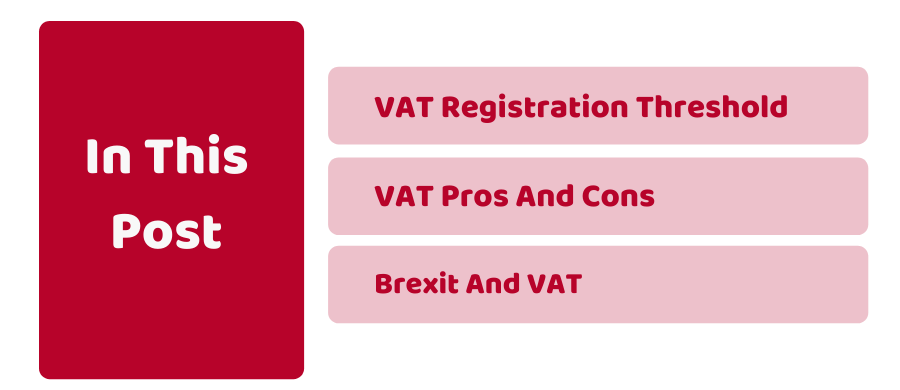Do you aim to set up a Small Business Journey and seeking guidance on this crucial UK Tax or VAT Threshold for Small Businesses? Our post is designed to answer frequently asked questions and will help you to see the right direction according to Government guidelines.
One of the major parts of the business fundamentals is to understand VAT ( Value Added Tax). Regardless of the type of business, your company intends to carry out, you must gather information about the current VAT threshold for small businesses and when do you need to register for VAT. as a beginner, one must manage time to sit with experts and professionals to get yourself benefits of a strong understanding of VAT registration and other important components related to it.
For the year 2020/2021, the threshold is 85,000 pounds. If you aim to start your business venture today, you should not expect it to remain the same for the next year. Generally, it moves higher with every passing year.
In This Post, We will focus on:
- VAT Registration Threshold
- VAT Pros And Cons
- Brexit And VAT
In 2007, the threshold was 64,000 pounds, in 2012 it turned higher to 77,000 pounds, and in 2016 83,000 pounds which shows the history of moving and higher and higher every passing year. it is required to be checked every year to ensure what the threshold is and hit if it makes financial sense to you before you jump into business.
For Registration VAT or deregistration threshold, our professionals offer the best services for smooth processing, contact us at your earliest!
VAT Registration Threshold:
VAT Threshold for small businesses is 85,000 pounds currently. In case your turnover exceeds the threshold, it is a compulsion for you to register it. Your financial guide or your accountant may guide you to it voluntarily to get your business registered. VAT Threshold for small businesses sets up your image in the business world as a serious businessman in terms of business growth and valuation.
Additionally, it is a gravitating factor for your business as well. the opportunity to claim for the VAT returns is open on your purchases. It will sound appealing and suitable for your clients and their corporate projects.
Still, confused about whether you should go for VAT Registration or not? Find the answers to commonly asked questions here with Accotax!
VAT Threshold – Pros And Cons:
Being heavily penalized and legally compliant are some of the prominent benefits of VAT registration. It is not only beneficial for large businesses but equally advantageous if it VAT Threshold for small businesses. let’s consider it in your business relationships and have a review of the pros and cons:
Pros:
- You can reclaim VAT on purchased goods and services.
- It is saving when your input tax is greater than the output tax.
- Your image in the business world is more serious if you are VAT registered.
- Unregistered for VAT, this status means losing your potential clients.
Cons:
- In case your output tax is more than your input tax, you might pay more tax than necessary.
- It requires more administration for paperwork.
- It is needed to file a return for which accounting software or accountants are required to manage smooth processing. Otherwise, you will have to manage it on your own.
- It pushes up prices when VAT is added in invoices when Mr. Public is the market target.
Seeking professional assistance for VAT Registration? Let us handle the hassle-free processing for you, contact us now!
Brexit And VAT:
VAT processes have a transition period, as Brexit comes in. One has to charge VAT to destination clients in the UK. Also, you have to register for VAT in the relevant country in case your products are hitting the value on point in clients country. Most commonly EU countries have their own VAT threshold as well.
What changes from July 2021 is:
Daistance selling threshold will not get any benefits from July 2021 in the UK.
The question arises here is what should be done in the first half of the year (January till July) and what must be done in the later half (July till December).
First Half (January – July 2021):
- For UK VAT, treat the sales with EU customers as zero rated export.
- Register VAT in EU country and act as importer of the products and services.
- You can hire an agent who will take the responsibility of the imported products and the services.
Second Half (July – December):
One-stop Shop is replacing with distance selling threshold.
The business will not require to register for VAT in every EU country.
Specific VAT rate of the relevant country will be charged.
If you register as a non union taxpayer, The UK business can use OSS in any EU state and domestic VAT returns are required to be submitted in the relevant state.
Conclusion:
To sum up the discussion of VAT threshold for small businesses, we hope that this post helped you gather basic information to help you for smooth processing after reviewing the details of pros and cons.If you intend to learn more, see what is mentioned below.
Accotax is ready to solve your business problems as swiftly as possible, so stop worrying about VAT Threshold if you are a seller.






















































